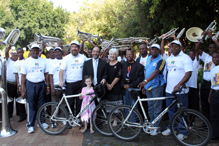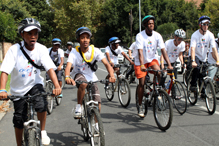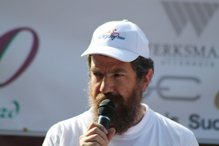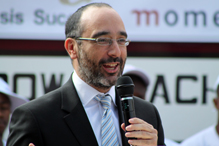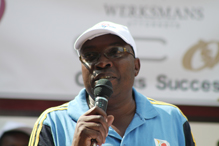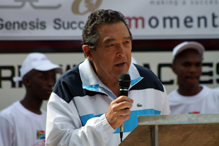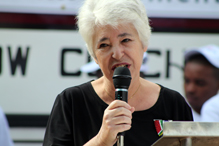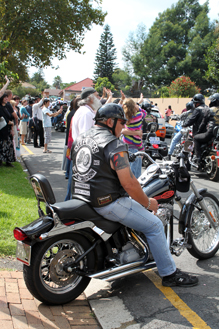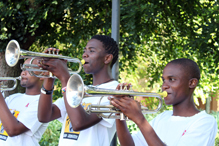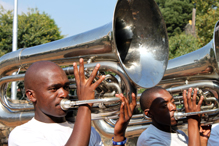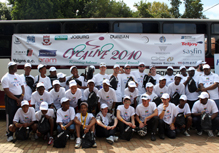
The 2010 Cycalive team next to their supporting bus, just before departure
March 21, 2010 – This morning, on Human Rights Day and the 50th anniversary of the Sharpeville Massacre, 30 Johannesburg teenagers set out on their bicycles for Durban, as the 13th annual Cycalive initiative and the first official event of this year’s Mandela Day got under way.
Cycalive mixes young people from different backgrounds – the 30 Grade 11 cyclists come from the Torah Academy in Orchards, Johannesburg, and the Pace and Moletsane high schools in Soweto. Their ride is sponsored by many corporates, and the money raised given to the Pace and Moletsane schools.
At a ceremony before the children hit the road, the Field Band Foundation from Springs played rousing tunes such as Oh, When the Saints! and the theme song from Fame, and several dignatories spoke about the initiative and the nation-building power of sport.
Rabbi Dovid Hazdan, one of the organizers of Cycalive, said, “Thirteen marks the age of maturity in Jewish faith and culture, and perhaps Cycalive has now come of age.”
Chief Rabbi of South Africa Warren Goldstein remarked that the journey these youngsters were undertaking was not just a physical journey, but a spiritual and emotional one, too. “As South Africans, we take our sport so seriously, but within sport is the power of nation building … Sport builds teams; it builds people; it builds the human spirit.”
He added that in today’s hi-tech world, where we are bombarded with messages from the internet, the media and other sources, we can easily forget about the simple things in life which are important. “We are celebrating today that joy for life. Getting on a bike and heading towards KwaZulu-Natal with the sun in your hair and the wind in your face – that is celebrating the simple joys of life.”
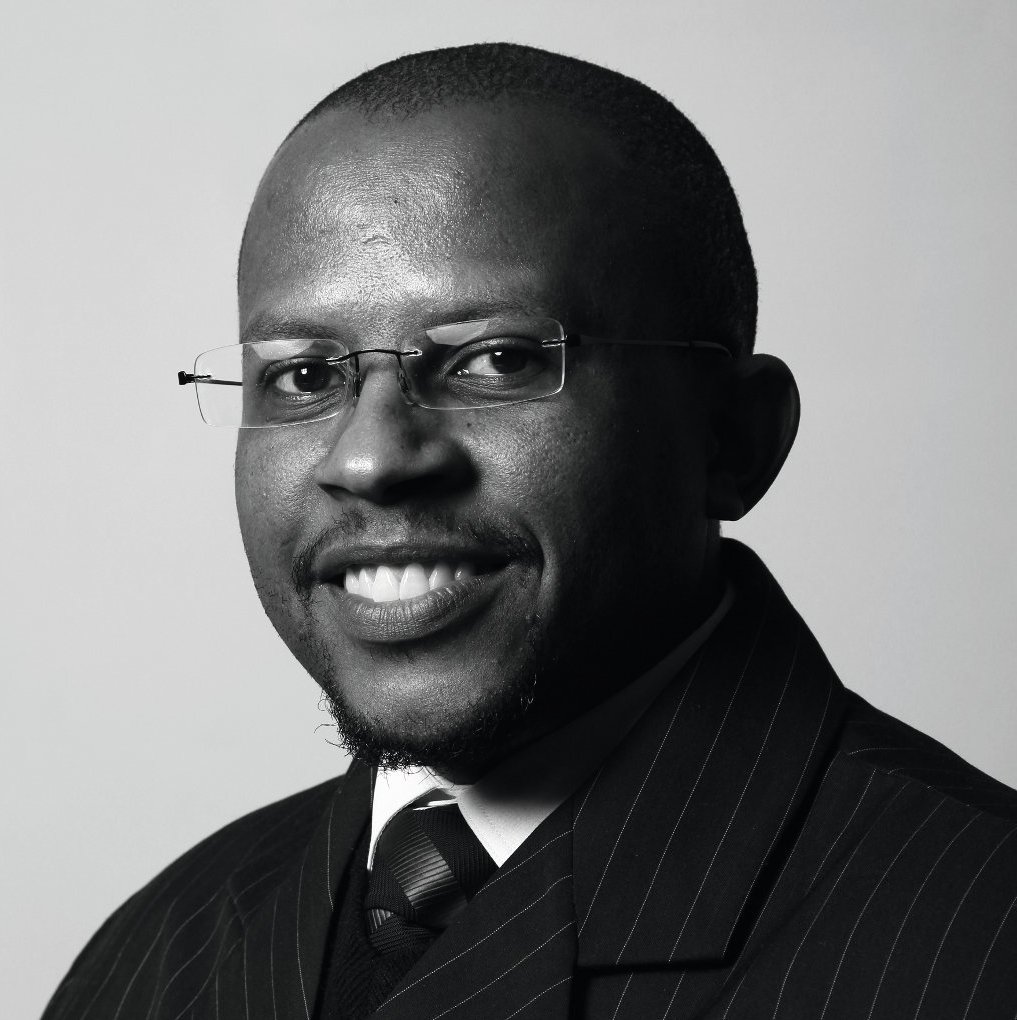
Sello Hatang, of the Nelson Mandela Foundation
The Nelson Mandela Foundation’s information communications manager, Sello Hatang, said, “Today marks the first Mandela Day event. We hope it will be the first of many organised by the Torah Academy.”
Hatang quoted Mr Nelson Mandela, who said in 2008, “The world remains beset by so much human suffering, poverty and deprivation. It is in your hands to make our world a better one for all.”
“With one small step, you can change the world,” said Hatang.
He explained that Mandela Day wasn’t about doing something for others just on July 18, Mr Mandela’s birthday, but about making a difference in your community throughout the year. “Mandela Day must be an everyday occurrence … All we ask for is for you to symbolically give 67 minutes, which is the number of years Nelson Mandela spent doing good for others. Of course, the athletes here will do much more than this and we acknowledge and appreciate their effort!”
He added, “We appreciate your commitment to Mandela Day. Please spread the word as you stop in villages, towns and cities, in churches, synagogues, temples, mosques, schools and hospitals along the way on the road to Durban. Good luck!”
Marlene Bethlehem, a past deputy-chairperson of the Commission for the Promotion and Protection of the Rights of Cultural, Religious and Linguistic Communities and past president of the South African Jewish Board of Deputies, reminded those present that 69 people died at the Sharpeville Massacre, which Human Rights Day now commemorates, exactly 50 years ago. Eight of those were women, she said, 10 were children, and 70% of those killed were shot in the back. “They were not attacking, but running away.”
Bethlehem commended the Cycalive organisers for their vision in bringing people of different backgrounds together. “Where there is no vision, the people will perish.”
Cricket supremo Ali Bacher, a former managing director of the South African Cricket Union and the United Cricket Board of South Africa which preceded it, also spoke, recalling that he had met Mr Mandela on many occasions during Madiba’s presidency, from 1994 to 1999.
Bacher said he personally remembered two particular attributes of Mr Mandela’s, although he had many others.
“He recognised the importance of sport in this country, and he was very, very strong in using sport as a powerful tool and weapon to bring the people of this country together.”
Secondly, said Bacher, Mr Mandela focused on reconciliation. “Although we have achieved so much as a country since democracy, I am not so sure we have the same warmth between peoples as we had between 1994 and 1999.
“I think it’s remarkable that black and white South Africans are going to get together on this fantastic journey,” he added.
Geoff Sifrin, editor of the Jewish Report, who played a role in setting up Cycalive, said it was important for young people from different backgrounds to get to know each other and enjoy each other’s company. “I’ve always thought that having fun is a basic human right. It’s not written into the Bill of Rights, but it’s something we as South Africans were denied for a long time.”
He pointed out, “The bicycle only stays up as long as you keep pedalling … As South Africans, we have to keep pedalling, never get off the bicycle and keep pedalling.
Dan Zimba, principal of Pace College, told the audience, “Moletsane High School and Pace College are among the best in Soweto and there is no doubt that some of their success is due to Cycalive.”
He said the entrance into Durban was always a highlight of the ride, but warned the cyclists, “There will be hills, but if you tell yourself you will climb the hill, you will. And remember, you are not doing it for yourself, but for the whole community.”
Just as he was about to leave, cyclist Lindo Mbewe, from Pace College, said he was “a bit scared, but excited!”
The 13th Cycalive set off with the cyclists and a supporting bus at 10am from the Torah Academy, headed for Durban, more than 500km away. They are expected to arrive on Thursday, 25 March.
The Field Foundation Band played a rousing version of the theme tune from Fame at the launch of the 13th annual Cycalive today
